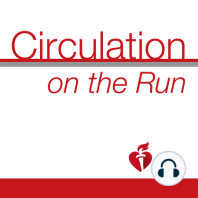17 min listen
Circulation October 30, 2018 Issue
ratings:
Length:
25 minutes
Released:
Oct 29, 2018
Format:
Podcast episode
Description
Dr Carolyn Lam: Welcome to Circulation on the Run, your weekly podcast summary and backstage pass to the journal and its editors. I'm Dr Carolyn Lam, associate editor from the National Heart Center and Duke National University of Singapore. This week's issue provides much long awaited healthcare resource utilization and cost implications in the MOMENTUM 3 randomized controlled trial of a magnetically levitated cardiac pump in advanced heart failure. All of this coming right up after these summaries. The first original paper this week provides important mammalian data on the acute effects of phosphodiesterase type 1 inhibition on the heart. Now phosphodiesterase type 1, or PDE1, is known to hydrolyze cyclic AMP and cyclic GMP in the heart. However, what's important to understand is that data from rodents may not be applicable to humans because rodents express mostly the cyclic GMP favoring PDE1A isoform, whereas human hearts predominantly express PDE1C isoform which has a balanced selectivity for cyclic AMP and cyclic GMP. In today's paper, first author Dr Hashimoto, corresponding author Dr Kass from Johns Hopkins University School of Medicine and colleagues, determined the acute effects of PDE1 inhibition on PDE1C expressing mammals, dogs and rabbits, in normal and failing hearts. They found that selective inhibition of PDE1 with ITI-214 induced positive inotropic, lusitropic, chronotropic, and arterial vasodilatory effects in dogs and rabbits. These effects occurred via cyclic AMP modulation and were observed in failing hearts. ITI-214 contractile increase was insensitive to beta adrenergic blockade or heart rate increase, but inhibited in vivo by adenosine receptor inhibition. Furthermore, isolated myocytes revealed differences between PDE1 and PDE3 inhibition. Wherein PDE3 inhibition, augmented beta receptor agonism and calcium transients, whereas PDE1 inhibition enhanced function without calcium increase. These findings have important clinical implications for ITI-214 which has completed phase 1 trials and may provide a novel therapy for heart failure. We know that macrophages are involved in foam cell formation in atherosclerotic plaques, but our next paper tells us we may now have a way to therapeutically modify this. Co-corresponding authors Dr Wei and Schober from Ludwig Maximilian's University Munich elucidated the role of microRNA generating enzyme Dicer in macrophage activation during atherosclerosis. They showed that Dicer deletion in macrophages accelerated atherosclerosis in mice, along with enhanced inflammatory response and increased lipid accumulation in lesional macrophages. In vitro, alternative activation was limited, whereas lipid filled foam cell formation was exacerbated in Dicer deficient macrophages due to impaired mitochondrial fatty acid oxidative metabolism. MicroRNA biogenesis promoted the degradation of fatty acids by mitochondrial respiration in macrophages, which in turn reduced intracellular lipid storage and limited atherosclerosis. Thus, reducing foam cell formation in atherosclerotic arteries by enhancing energy metabolism through microRNA mediated fatty acid oxidation may be a promising approach for the treatment of atherosclerosis. The next study evaluates how aortic stiffening relates to resting cerebral blood flow and cerebral vascular reactivity in older adults. First and corresponding author Dr Jefferson from Vanderbilt Memory and Alzheimer's Center and her colleagues studied participants free of clinical dementia, stroke, or heart failure, including 155 older adults with normal cognition and 115 mild cognitive impairment. They found that greater thoracic aortic stiffening quantified by cardiac magnetic resonance was associated with lower cerebral blood flow in cognitively norma
Released:
Oct 29, 2018
Format:
Podcast episode
Titles in the series (100)
Circulation January 24, 2017 Issue: Circulation Weekly: Your Weekly Summary & Backstage Pass To The Journal by Circulation on the Run
